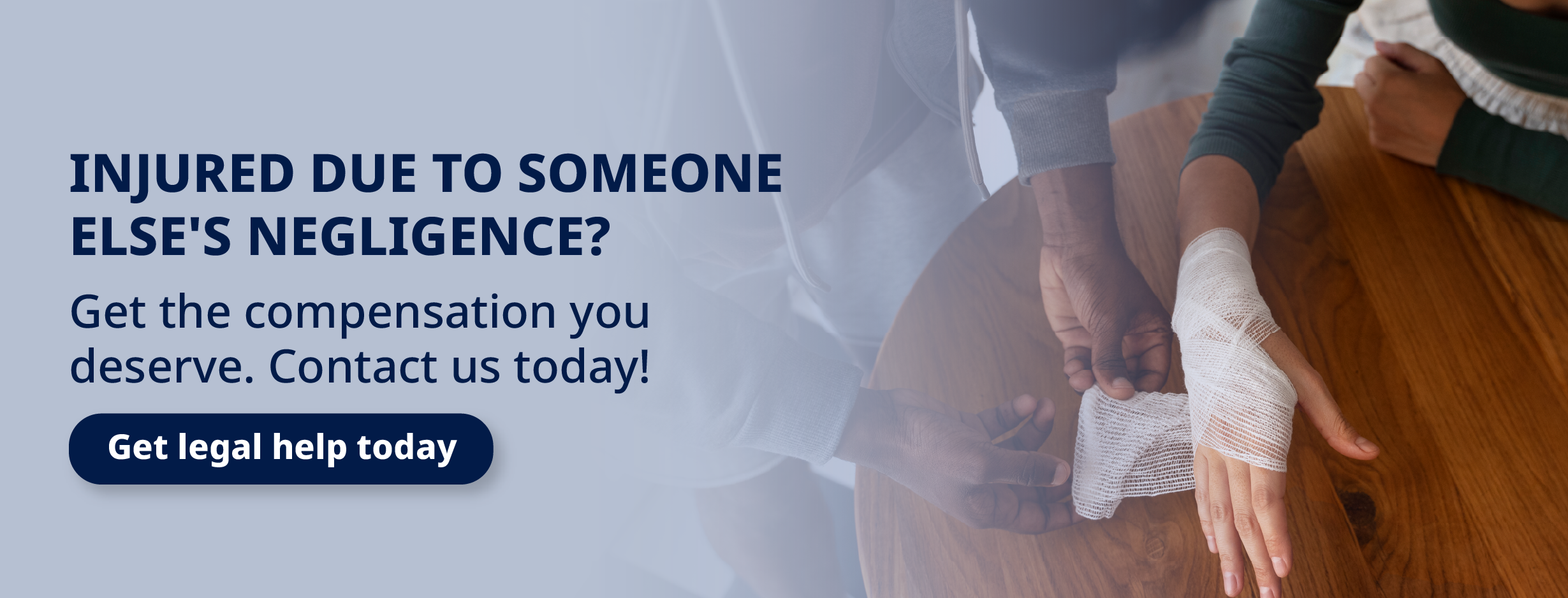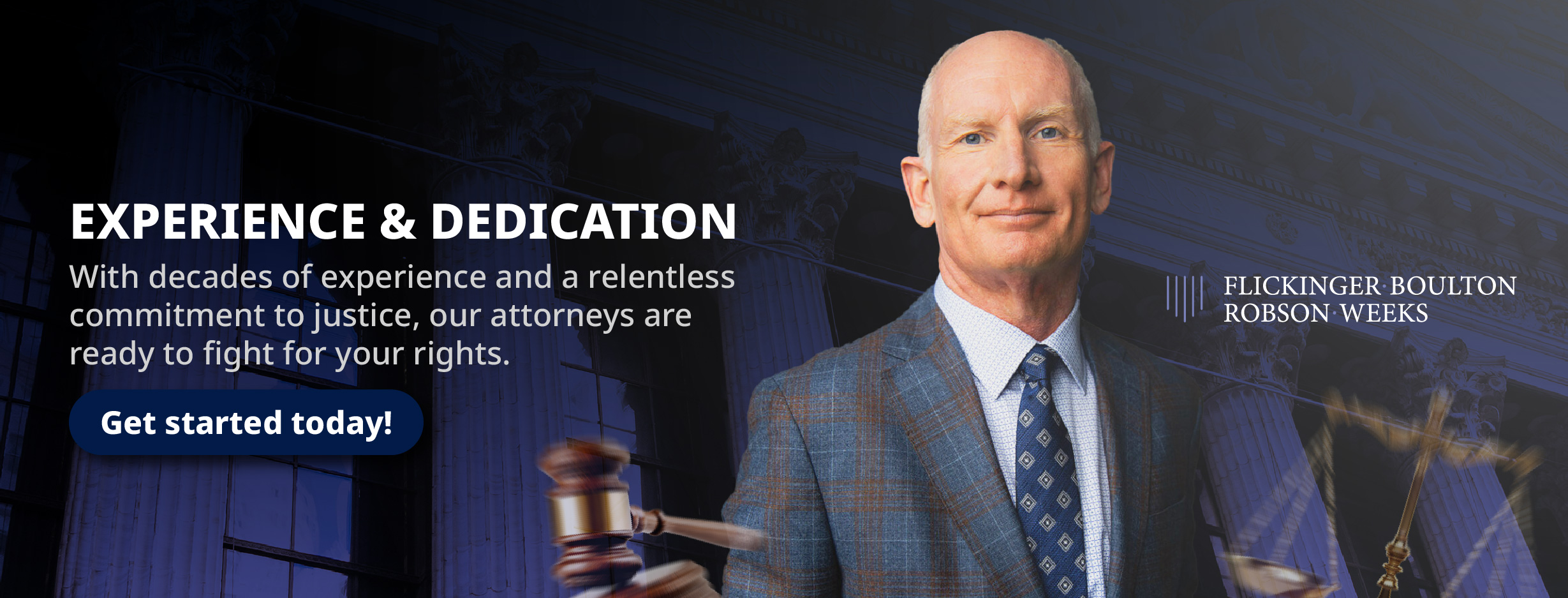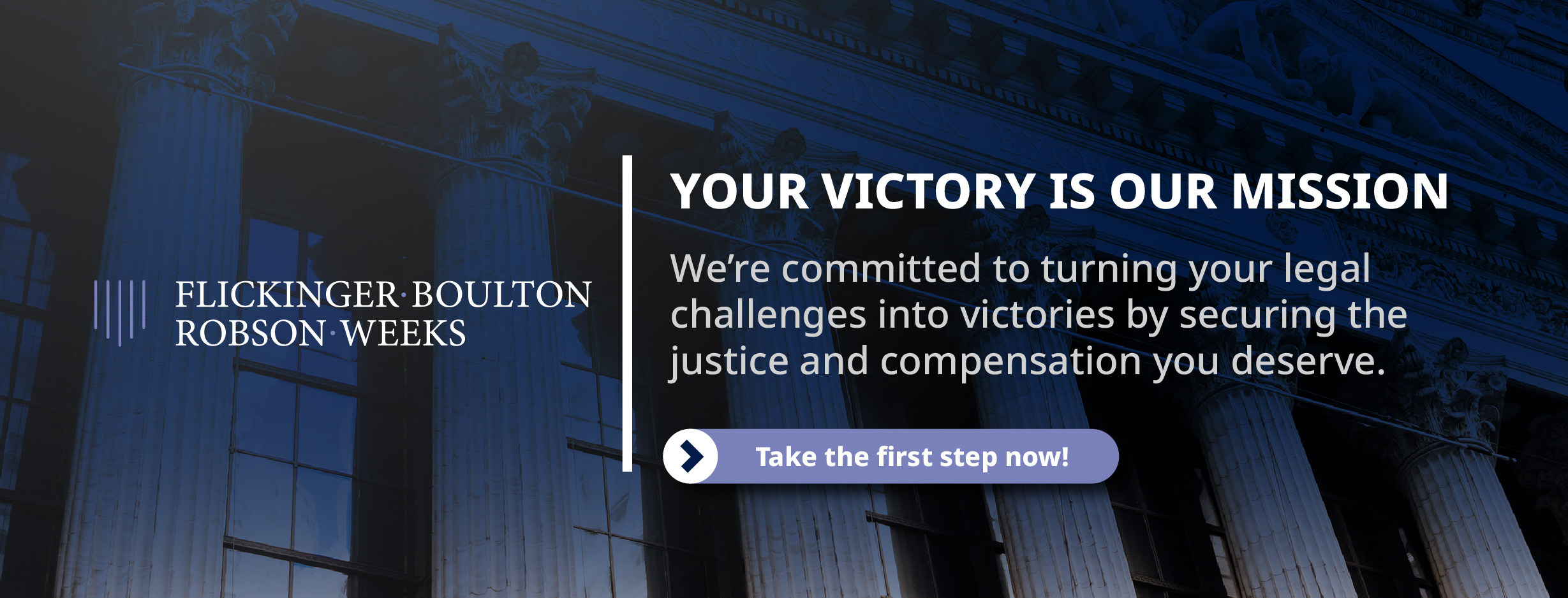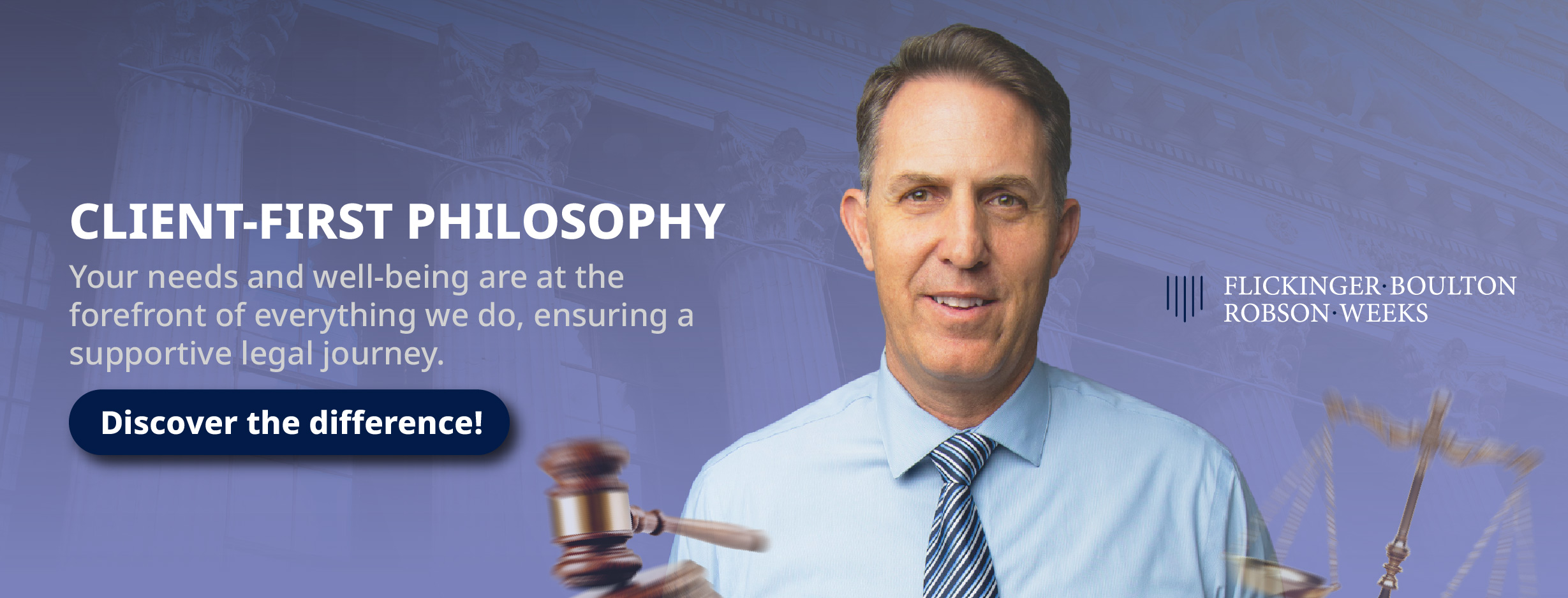Don’t let insurance companies undervalue your claim or delay your recovery. Our Personal Injury Lawyer Utah team is here to advocate for your best interests every step of the way. Contact Flickinger Boulton Robson Weeks today and take the first step toward securing the justice and financial recovery you deserve.
An unexpected injury can turn your life upside down, leaving you with mounting medical bills, lost wages, and lasting pain. If someone else’s negligence caused your injuries, you can seek compensation for all the suffering you endured.
At Flickinger Boulton Robson Weeks, our experienced personal injury lawyers in Utah are dedicated to protecting the rights of injury victims across the state. Whether you were hurt in a car accident, slip and fall, workplace injury, or another type of accident, we are here to fight for the maximum compensation you deserve.
We understand how overwhelming the aftermath of an injury can be, and our Personal Injury Lawyer Utah team is committed to making the legal process as stress-free as possible. We handle every aspect of your claim, from investigating the accident and gathering evidence to negotiating with insurance companies and, if necessary, taking your case to court.
With decades of experience and a track record of success, we are prepared to stand by your side and aggressively pursue justice on your behalf.
If you or a loved one has suffered an injury due to someone else’s negligence, don’t wait to seek legal help. Contact our team of Utah personal injury lawyers at Flickinger Boulton Robson Weeks today for a free consultation, and let us help you confidently move forward.
Personal Injury Lawyer Utah specializes in legal remedies and defenses for civil lawsuits arising from wrongful conduct causing harm. This area of law aims to compensate victims.
Personal injury cases in Utah arise from various incidents, including:
In 2021, Utah reported 61,406 motor vehicle accidents, resulting in numerous injuries and fatalities.
The number of work-related deaths in Utah increased from 52 in 2021 to 57 in 2022, with an overall fatal injury rate of 3.6 per 100,000 workers.
These accidents commonly occur in both residential and commercial settings, leading to significant injuries.
Cases where healthcare professionals deviate from standard care, resulting in patient harm.
In Utah, the statute of limitations for personal injury claims is generally four years from the date of the injury. However, this period can vary depending on the case type, so it’s essential to consult with a legal professional promptly.

Utah follows a modified comparative negligence rule. This means that if a plaintiff is found to be partially at fault for their injuries, their compensation is reduced by their percentage of fault. However, if they are found to be 50% or more at fault, they are barred from recovering any damages. A Personal Injury Lawyer Utah can help you navigate these laws and protect your rights.
Victims of personal injury in Utah may be entitled to various forms of compensation, including:
This is crucial for victims seeking justice and fair compensation after being injured. Given the complexities involved, consulting with an experienced personal injury attorney is advisable to navigate the legal process effectively.
Personal injury law covers a wide range of incidents where a person suffers harm due to another party’s negligence or intentional misconduct. To qualify as a personal injury case, the victim must establish that another party was legally responsible for their injury and that they suffered measurable damages. A Personal Injury Lawyer Utah can help victims navigate the legal process and seek the compensation they deserve.
Below are key factors determining whether an incident qualifies as a personal injury case.
Most personal injury claims arise from negligence, meaning the responsible party failed to exercise reasonable care, resulting in harm to another person. Common negligence-based personal injury cases include:
If a driver was speeding, distracted, or intoxicated and caused an accident, they can be held liable for injuries.
Property owners must maintain safe conditions; failure to fix hazards like wet floors or broken stairs can lead to liability.
When a healthcare provider’s negligence leads to patient harm, such as surgical errors or misdiagnoses, the victim may have a claim.
Not all personal injury cases involve accidents. Victims of intentional acts can also seek compensation, including:

Some personal injury cases do not require proof of negligence or intent. Strict liability applies when a party is responsible regardless of fault. Examples include:
Personal injury claims can also arise from unsafe workplaces or hazardous property conditions.
Personal injury cases cover a broad range of incidents involving negligence, intentional misconduct, or strict liability. If you were harmed due to another party’s actions, you may have grounds for a claim. Consulting a Personal Injury Lawyer Utah can help determine your legal options and maximize your compensation.
Understanding Utah’s personal injury laws is crucial for anyone seeking compensation after an injury. These laws dictate how claims are filed, the timeframe for legal action, and the potential compensation available.
The statute of limitations sets the deadline for filing a personal injury lawsuit in Utah. Missing this deadline can result in losing the right to pursue compensation.
Utah law stipulates a four-year statute of limitations for most personal injury cases, starting from the date of the injury.
For wrongful death lawsuits, the statute of limitations is two years from the date of death.
When the defendant is a government entity, a notice of claim must be filed within one year. Because legal deadlines vary, consulting a Utah personal injury lawyer as soon as possible can ensure your case is filed on time.
Utah follows a modified comparative negligence rule, allowing injured parties to recover damages even if they are partially at fault, provided their fault is less than 50%. However, the compensation is reduced by their percentage of fault.
Example: If an injured party is found 20% at fault and the total damages amount to $100,000, they can recover $80,000 (i.e., $100,000 minus 20%).
Understanding these laws is vital for effectively navigating a personal injury claim in Utah:
Given the complexities of Utah’s personal injury laws, consulting with an experienced Personal Injury Lawyer Utah is advisable to navigate the legal process effectively and maximize your potential recovery.
Utah imposes caps on certain types of damages in personal injury cases:
Utah operates under a no-fault insurance system, requiring drivers to carry Personal Injury Protection coverage. This system mandates that after an accident, each party’s insurance covers their medical expenses and related losses, regardless of who caused the accident.
Key Points:
The statute of limitations is a critical legal deadline determining how long an injured party must file a lawsuit. In Utah, personal injury claims are subject to specific time limits depending on the nature of the case. Missing this deadline can result in losing the right to seek compensation, making it essential for victims to act promptly. Consulting a Personal Injury Lawyer Utah can help ensure all deadlines are met and protect your legal rights.

For most personal injury cases, including car accidents, slip and falls, and product liability claims, Utah law sets the statute of limitations at four years from the date of the injury. If a lawsuit is not filed within four years, the court will likely dismiss the case, barring the victim from recovering compensation.
If an injury results in death, surviving family members may file a wrongful death claim. In Utah, the statute of limitations for wrongful death lawsuits is two years from the date of death. Since wrongful death claims involve additional legal complexities, families should consult an attorney as soon as possible.
Medical malpractice cases, such as surgical errors, misdiagnoses, or medication mistakes, have a shorter statute of limitations than general personal injury claims. Victims must file a lawsuit within two years from the date they discovered (or should have discovered) the injury, but no later than four years from the date of the negligent act.
Stricter deadlines apply when a personal injury claim involves a government agency or employee. Victims must first file a notice of claim within one year of the injury. If the claim is denied, the injured party has one year from the denial date to file a lawsuit. These short deadlines make it crucial to act quickly.
In certain cases, the statute of limitations may be extended or paused under specific circumstances, such as:
Understanding Utah’s statute of limitations is crucial for anyone pursuing a personal injury claim. Failing to file within the required timeframe can prevent victims from recovering compensation for medical expenses, lost wages, and pain and suffering.
To ensure deadlines are met and legal rights are protected, consulting a Personal Injury Lawyer Utah as soon as possible is strongly recommended. An experienced attorney can help establish damages and build a strong case for compensation.
Suffering an injury can be overwhelming, but taking the right steps immediately afterward can protect your health, legal rights, and ability to seek compensation.
Knowing what to do can make a significant difference in your recovery and legal case, whether the injury occurs in a car accident, a slip and fall, or another incident.

Your health is the top priority after an injury. Even if you feel fine, some injuries. Such as concussions or internal damage, may not show immediate symptoms. Seeking medical attention ensures that:
If the injury is severe, call 911 or ask someone to take you to the emergency room. For less serious injuries, visit a doctor as soon as possible.
Depending on the type of accident, you may need to report it to the appropriate authorities:
Having an official record of the incident can strengthen your case if you need to pursue legal action.
If you are physically able to, collect evidence from the scene before it is altered or cleaned up. This may include:
If an insurance company contacts you after the injury, be cautious about what you say. Insurance adjusters may try to minimize your claim or shift blame. Avoid:
It is best to let an experienced Personal Injury Lawyer Utah handle communication with insurance companies to protect your rights and maximize your compensation.
At Flickinger Boulton Robson Weeks, we will fight on your behalf to protect your rights and interests, ensuring to reflect the true extent of your suffered damages so you get the maximum settlement.
Navigating a personal injury claim can be complex, especially when dealing with medical bills and insurance negotiations. An experienced personal injury lawyer can:
Evaluate your case and determine liability.
Handle negotiations to maximize your compensation.
Represent you in court if a settlement cannot be reached.
Taking the right steps after an injury can protect your health and legal rights. Seeking medical care, documenting the incident, and consulting an attorney can help ensure you receive the compensation you deserve. If you have been injured due to someone else’s negligence, don’t wait; speak with a personal injury lawyer today.
Whether the case involves a car accident, slip and fall, or medical malpractice, the injured party (plaintiff) must establish key legal elements to hold the at-fault party accountable. A Personal Injury Lawyer Utah can help gather evidence and build a strong case for compensation.
Whether the case involves a car accident, slip and fall, or medical malpractice, the injured party (plaintiff) must establish key legal elements to hold the at-fault party accountable.
To successfully prove negligence, the plaintiff must demonstrate four essential elements:
Each of these elements must be supported by evidence to build a strong personal injury claim.
In Utah, duty of care depends on the circumstances of the case. For example:
If a defendant owed a duty of care to the plaintiff, the next step is proving they breached that duty.
A breach of duty occurs when someone acts negligently or fails to take reasonable precautions. Examples include:
To prove a breach of duty, evidence such as witness testimony, surveillance footage, accident reports, and expert opinions may be necessary.
The plaintiff must show that the defendant’s breach of duty directly caused their injury. This is known as causation and consists of two parts:
For example, suppose a drunk driver runs a red light at the intersection of 9000 South and State Street in Sandy and crashes into another vehicle, causing the other driver to suffer a broken leg; in that case, the connection between the drunk driver’s negligence and the injury is apparent.
In such cases, the impaired driver would likely be held liable for the victim’s medical expenses, lost wages, and other damages resulting from the crash.
To recover compensation, the plaintiff must demonstrate that they suffered measurable damages as a result of the accident. These may include:
Medical records, pay stubs, expert testimony, and personal statements can help establish damages.
Utah follows a modified comparative negligence rule, meaning a plaintiff can recover compensation as long as they are less than 50% at fault for the accident. However, their compensation is reduced by their percentage of fault.
For example, if a court finds the plaintiff 20% responsible for a car accident and awards $100,000 in damages, the plaintiff would receive $80,000 after the reduction.
Proving negligence in a Utah personal injury case requires demonstrating duty of care, breach of duty, causation, and damages. Gathering strong evidence, such as medical records, witness statements, and expert testimony, is crucial to building a successful case. Defendants and insurance companies often dispute liability, so working with an experienced Utah personal injury lawyer can help ensure victims receive the compensation they deserve.
In Utah, individuals who suffer injuries due to another’s negligence are entitled to seek compensation to address the various losses incurred. Understanding the types of damages available is crucial for victims aiming to recover fully from their injuries. A Personal Injury Lawyer Utah can help assess the full extent of damages and pursue the maximum compensation possible.
Economic damages, also known as special damages, are intended to compensate victims for quantifiable financial losses resulting from an injury. These typically include:
Non-economic damages, or general damages, compensate for intangible losses that don’t have a specific monetary value but significantly impact the victim’s quality of life. These may include:
Utah courts may award punitive damages in certain cases where the defendant’s actions are deemed particularly reckless or malicious. These are designed to punish the wrongdoer and deter similar conduct in the future.
Punitive damages are, however, relatively rare and are awarded in addition to compensatory damages.
Several factors can influence the amount of compensation awarded in a personal injury case:
Understanding the various types of compensation available for personal injury victims in Utah is essential when seeking to recover from their losses. Consulting with an experienced Personal Injury Lawyer Utah can provide guidance tailored to the specifics of the case, ensuring that victims pursue all appropriate avenues for compensation.
A few of our more notable case results include:
The firm has a strong history of securing substantial settlements and verdicts for its clients, including:
These case results demonstrate the firm’s commitment to fighting for justice and ensuring injury victims receive the compensation they deserve.
At Flickinger Boulton Robson Weeks, we understand that navigating a personal injury case can be overwhelming. Whether you’ve been injured in a car accident, slip and fall, or workplace incident, our experienced team of Utah personal injury attorneys is here to fight for your rights and help you secure the compensation you deserve.
From investigating the accident to negotiating with insurance companies, we handle every aspect of your case so you can focus on recovery.
Building a strong personal injury case requires solid evidence and a well-prepared legal strategy. Our firm conducts a detailed investigation by:
Insurance companies often try to minimize payouts or deny claims altogether. Our attorneys protect you from unfair settlement offers by:
If a fair settlement cannot be reached, we are fully prepared to take your case to court. Our trial lawyers have the experience and dedication needed to present a compelling case before a judge and jury.
No matter how complex your case may be, Flickinger Boulton Robson Weeks is committed to fighting for justice on your behalf. Contact us today for a free consultation, and let a Personal Injury Lawyer Utah help you take the first step toward financial recovery.
No, most personal injury cases are based on negligence, not intent. You only need to prove that the responsible party failed to act with reasonable care and that their negligence caused your injury. However, in cases involving intentional harm, such as assault or battery, you may be able to file a personal injury claim in addition to any criminal charges the perpetrator faces.
Yes, some injuries, such as whiplash, concussions, or internal injuries, may not become apparent until days or even weeks after the accident. Utah’s statute of limitations generally gives you four years to file a personal injury lawsuit, so you can still pursue a claim once your injuries are diagnosed. However, seeking medical attention immediately after an accident can strengthen your case.
If you were injured in Utah but reside in another state, your personal injury claim will still be handled under Utah law since the accident occurred within the state. However, out-of-state victims may need to work with a Utah-based attorney who understands local laws and can represent them in Utah courts if necessary.
Generally, compensation for physical injuries is not taxable under federal and Utah state tax laws. This includes damages for medical expenses, lost wages, and pain and suffering related to a physical injury. However, punitive damages and interest earned on settlements may be taxable. Consulting a tax professional can help clarify any tax implications for your specific case.
While it’s always best to report an accident immediately, failing to do so does not necessarily prevent you from filing a claim. However, the longer you wait, the harder it may be to prove your case. Evidence can disappear, and witnesses may forget key details. If you did not report the accident immediately, seeking medical treatment and documenting your injuries as soon as possible can support your claim.
While it’s always best to report an accident immediately, failing to do so does not necessarily prevent you from filing a claim. However, the longer you wait, the harder it may be to prove your case. Evidence can disappear, and witnesses may forget key details. If you did not report the accident immediately, seeking medical treatment and documenting your injuries as soon as possible can support your claim.
UTAH INJURY LAWYERS
Flickinger • Boulton
• Robson • Weeks
PROVO OFFICE
3000 N University Ave
Suite 300
Provo, UT 84604
SOUTH JORDAN OFFICE
10393 S. Temple Dr.
Suite 103
South Jordan, Utah 84095
OFFICE HOURS
Monday- Friday: 8AM-5PM
Saturday-Sunday: Closed
*Disclaimer: the information provided by this website is for informational purposes only and should not be considered legal advice or a substitute for competent legal counsel.
**SMS consent and contact phone numbers will not be shared or sold to third parties or their affiliates for any purpose.
© 2025 All Rights Reserved.